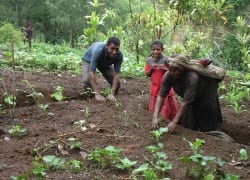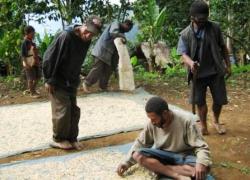Conflict and violence are a daily reality in many parts of the Highlands of Papua New Guinea (PNG). Ongoing violence and tribal conflicts undermine all types of development in the region, whether it’s economic development, health or education. It’s a major problem in a country where more than half the population lives on less than US$1 a day and rural communities have little or no access to many basic services such as health care.
Conflict and violence are a daily reality in many parts of the Highlands of Papua New Guinea (PNG). Ongoing violence and tribal conflicts undermine all types of development in the region, whether it’s economic development, health or education. It’s a major problem in a country where more than half the population lives on less than US$1 a day and rural communities have little or no access to many basic services such as health care.
 |
| Oxfam provides practical support, such as helping families grow nutritional gardens with more diverse crops, and rearing small livestock like goats, rabbits and chickens. |
Finding local solutions
Oxfam and its partner, the Community Development Agency (CDA), are working with rural communities in Simbu Province in PNG, helping them work together to improve their living conditions and find solutions to local problems.
CDA is helping families find ways of earning a better income through practical work with coffee farmers to improve crop yields, helping people grow nutritional gardens with more diverse crops, and technical advice for rearing small livestock like goats, rabbits and chickens.
By working together, sharing responsibility, and through practical support to improve cash incomes, CDA is encouraging communities to strive for a peaceful future in areas that are traditionally beset by tribal conflicts and violence.
Livelihoods work brings peace
“It isn’t easy to get people to change their mindset,” says Yanny Guman, Oxfam’s Simbu Coordinator, “But the livelihoods work is helping many people and communities to explore their own potential, their current weaknesses and to identify the local resources available to overcome these.
“When we spoke to communities working with CDA, many people mentioned a reduction in incidences of tribal fighting. Peace and stability also allow people to divert energy towards improving their livelihoods instead of being unable to access their garden land, dealing with conflicts and paying compensation for damages caused during conflict.”
Livelihoods Assistant, Trudie Sikas, adds: “Another impressive change was the greater respect shown to women in the communities as their important contributions were acknowledged. Many communities had more equal participation in community projects from women and young people. This is unusual for rural PNG, especially in the Highlands where although women and children do the majority of agricultural tasks, they are traditionally excluded from decision-making and leadership roles.”
 |
| Coffee farmers drying their beans. Coffee farmers have seen a good increase in their incomes and many children are returning to school as their families can now afford the fees. |
Meet Joe Drekore, Community Facilitator from Kelmakeli Village
Joe Drekore is a Community Facilitator from Kelmakeli Village in Gumine District, Simbu Province. He told us: “Coffee farmers have seen a good increase in their incomes. Many farmers have stopped selling to the middle-men and instead are selling beans direct to coffee processers and exporters in Goroka; that’s been orgnised by CDA and Oxfam.
“Lots of children are now returning to school too, as their families can now afford the fees. Many of the men are now starting to realise the importance of their family and their children’s welfare and are saving for the future.”
Young people want to build a better future
Joe adds: “We’d like to see more people from the community trained up so they can pass on the information and knowledge. Our young people in particular really want to get involved with the work of CDA.”
For PNG’s young population – 40% are under 15 – many are entering adulthood facing a wide range of health and social issues. CDA’s work is providing vital support for young people, women and the wider community to build a better, safer, more sustainable future for themselves.



